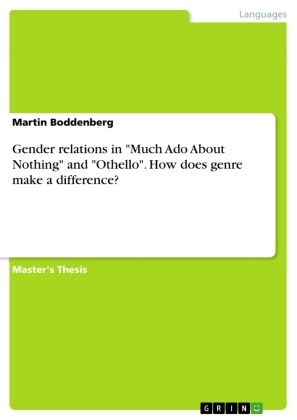Mehr lesen
Master's Thesis from the year 2016 in the subject Didactics for the subject English - Literature, Works, grade: 2,5, Humboldt-University of Berlin (Institut für Anglistik und Amerikanistik), language: English, abstract: I want to start my thesis by briefly discussing one of the seminal works on historical gender studies, Thomas Laqueur's "Making Sex". He argues that based on the publications of an old Greek physician named Galen, women and men were regarded as the same sex in Europe for about 2,000 years from the second century AD to circa 1800. He claims that male and female genitals were depicted and regarded as the same, with the only difference that the female genitalia were inside whereas the male genitalia were outside. Men and women were supposed to be different in degree but not in kind. Women were considered an imperfect version of men, since they were cooler, wetter, and more passive. Thus, the supposed sameness of the physical characteristics of men and women did by no means promise equality of the sexes; on the contrary, it underpinned the hierarchy and male superiority. Furthermore, women stood for fleshiness and desire. The connection of passiveness and desire as female traits seems controversial but is typical of the time. The idea of lustful, desirous, and uncontrollable women changed quite a lot later, especially in the 19th century, when women were usually supposed to have no or a very low sexual drive. Although we also find "the fallen woman" in 18th and 19th century literature, who is unable to control her sexual passion. The concept of a promiscuous female sexuality in Shakespeare's time might seem a bit odd to us today, but if we look at the plays, we find exactly this idea of women being lustful and uncontrollable for men. Laqueur claims that "Sometime in the eighteenth century, sex as we know it was invented". This means that Shakespeare's contemporaries would still have had an ancient understanding of sex (or gender) differences. Although the concept of gender was not yet developed in Shakespeare's time, I believe it is useful and justifiable to talk about gender relations. It is inevitable to take a modern perspective, and the concept of gender is not restricted to men and women of the 20th and 21st centuries; it is definitely applicable to Shakespeare's characters, too, as I will try to show in this thesis.

